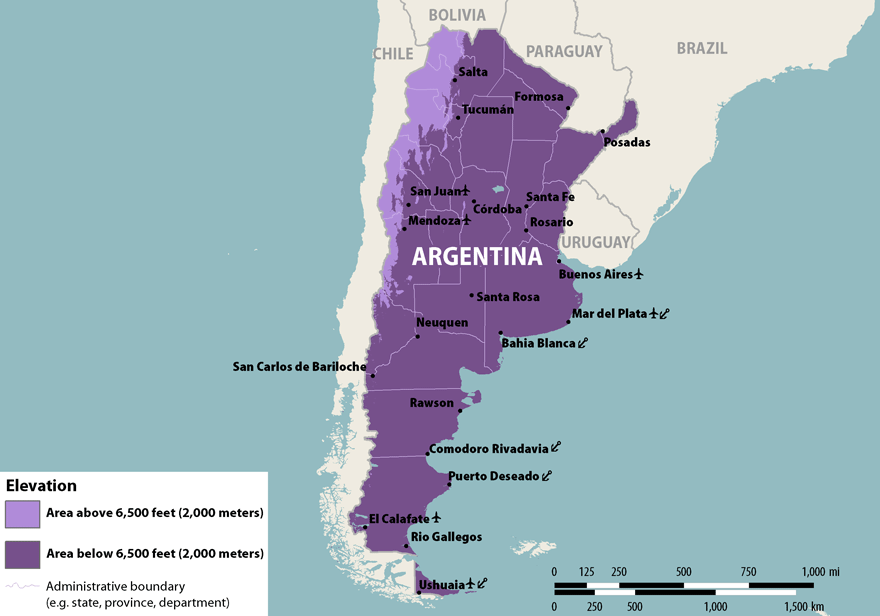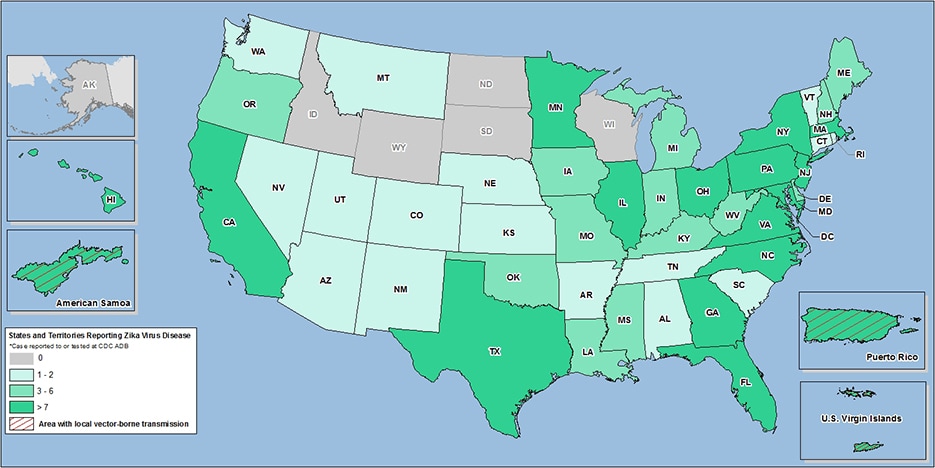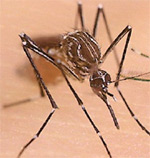Archive for the ‘Zika virus’ Category
Local transmission of Zika virus infection has been reported in Tucumán Province, Argentina.
Friday, May 27th, 2016
Zika Virus in Pregnancy
A pregnant woman can pass Zika virus to her fetus. Infection during pregnancy can cause serious birth defects. CDC recommends special precautions for the following groups:
- Women who are pregnant:
- Should not travel to any area of Argentina below 6,500 feet (see map).
- If you must travel to one of these areas, talk to your doctor first and strictly follow steps to prevent mosquito bites during your trip. If your itinerary is limited entirely to areas above 6,500 feet, there is minimal risk of getting Zika from a mosquito.
- If you have a male partner who lives in or has traveled to Argentina, either use condoms or do not have sex (vaginal, anal, or oral) during your pregnancy.
- Women who are trying to become pregnant:
- Before you or your male partner travel, talk to your doctor about your plans to become pregnant and the risk of Zika virus infection.
- See CDC guidance for how long you should wait to get pregnant after travel to Argentina.
- You and your male partner should strictly followsteps to prevent mosquito bites.
- Men who have traveled to an area with Zika and have a pregnant partner should use condoms or not have sex (vaginal, anal, or oral) during the pregnancy.
CDC researchers estimate that the risk of microcephaly is 1% to 13% in those sickened with Zika during their first trimester.
Friday, May 27th, 2016Wolbachia bacteria may curb the ability of A aegypti to transmit Zika virus.
Wednesday, May 25th, 2016“….MosquitoMate’s strategy is to release infected males to mate with uninfected females. Eggs fertilized by infected males don’t hatch, which helps reduce mosquito populations. In tests in three US states over the past 3 years, the mosquitoes reduced wild A albopictus populations by about 70%….”
WHO: Zika virus strain imported from the Americas to Cabo Verde
Saturday, May 21st, 201620 MAY 2016 | BRAZZAVILLE – Sequencing of the virus in Cabo Verde by Institut Pasteur, Dakar confirms that the Zika virus currently circulating in Cabo Verde is the same as the one circulating in the Americas – the Asian type- and was most likely imported from Brazil. This is the first time that the Zika strain responsible for the outbreaks linked to neurological disorders and microcephaly has been detected in Africa.

“The findings are of concern because it is further proof that the outbreak is spreading beyond South America and is on the doorstep of Africa. This information will help African countries to re-evaluate their level of risk and adapt and increase their levels of preparedness,” said Dr Matshidiso Moeti, WHO Regional Director for Africa.
As a first step, these countries should heighten risk communication to pregnant women to raise awareness of complications associated with the Asian type of Zika virus and promote protection steps to avoid mosquito bites as well as sexual transmission. In addition, countries should increase their surveillance for Zika transmission and congenital malformations, such as microcephaly, as well as Guillain-Barré syndrome.
Activated since February 2016, WHO Zika Virus Disease Incident Management System in Brazzaville and at Headquarters will continue to review existing risk assessments, increase surveillance, and assess laboratory testing capacity and support community engagement and risk communications in priority countries. In addition, WHO and its partners will support the countries in the African region to step up preparedness efforts for early detection, confirmation and management of potential complications related to Zika infection. The response will build on investments in strengthened systems made in West Africa during the Ebola emergency.
Zika in Cabo Verde
As of 8 May 2016, there have been 7557 suspected cases of Zika in Cabo Verde. Three cases of microcephaly have been reported from Cabo Verde with one case reported by the U.S. Centers for Disease Control and Prevention (CDC) after being delivered in the United States. So far, no case of Guillain-Barre Syndrome (GBS) has been reported from Cabo Verde.
Cartoon Network Latin America is launching “Mission Zika,” an educational campaign to raise awareness about Zika.
Friday, May 20th, 2016https://youtu.be/t395wCXm0hc?t=14
The US House of Representatives approves a $622.1 million Zika funding bill designed to support key outbreak activities through September, much less than the $1.9 billion emergency measure CDC asked for.
Friday, May 20th, 2016Puerto Rico: First American whose fetus developed microcephaly because of Zika virus
Saturday, May 14th, 2016CDC has estimated that 20 percent or more of the island’s 3.5 million residents will become infected with Zika this year.

Singapore: A 48-year-old man, a permanent resident of Singapore, tested positive for Zika virus following a trip to Sao Paulo, Brazil, from March 27 to May 7.
Saturday, May 14th, 2016
The Ministry of Health (MOH) and National Environment Agency (NEA) were informed on 13 May 2016 of the first imported case of Zika virus infection in Singapore. The patient is a 48-year-old male Singapore Permanent Resident who had travelled to Sao Paulo, Brazil from 27 March to 7 May 2016. The patient developed fever and rash from 10 May and was admitted to Mount Elizabeth Novena Hospital on 12 May 2016 and isolated.
2. The patient was tested positive for Zika virus infection on 13 May. He will be transferred to the Communicable Diseases Centre at Tan Tock Seng Hospital for treatment and isolation to minimise the chances of being bitten by mosquitoes and spreading the infection in the community. The patient is currently well and recovering. He will only be discharged upon being tested negative for the Zika virus.
3. MOH is screening the patient’s household members. They have been advised to monitor their health and seek medical treatment if unwell. MOH and NEA will also actively alert residents in the vicinity to seek medical attention should they develop symptoms of fever and rash.
Vector Control
4. The patient’s residence at Watten Estate is not an active dengue cluster. NEA has intensified vector control operations to control the Aedes mosquito population in the areas around the case’s residence. NEA has redeployed additional officers from other areas to conduct the stepped up operations. NEA has also commenced outreach efforts and distributed Zika information leaflets and insect repellents to residents living in the area. NEA’s intensified vector control operations include:
- Inspecting all premises, ground and congregation areas upon case notification;
- Conducting mandatory treatment such as ultra-low volume (ULV) misting of premises and thermal fogging of outdoor areas to kill adult mosquitoes;
- Increasing frequency of drains flushing and oiling to prevent breeding; and
- Public education outreach and distribution of insect repellents
5. As the majority of people infected with the virus do not show symptoms, it is possible that some transmission may already have taken place before the first confirmed case of Zika was notified. Hence, even as NEA conducts operations to contain the transmission of the Zika virus, residents are urged to cooperate fully with NEA and allow its officers to inspect their premises for mosquito breeding and to spray insecticide to kill any mosquitoes. NEA may need to gain entry into inaccessible premises by force after serving of requisite Notices, to ensure any breeding habitats are destroyed quickly.
6. To minimise the risk of any spread of Zika in Singapore, it is critical that all of us as a community take immediate steps to prevent mosquito breeding in our homes by doing the 5-step Mozzie Wipeout every alternate day, and protect ourselves from mosquito bites by applying insect repellent regularly.
Health Advisory
7. We advise residents of Watten Estate, Casa Perla, Hillcrest Arcadia, The Arcadia and Watten Hill Condominium to monitor their health. They should seek medical attention if unwell, especially if they develop symptoms such as fever and rash. They should also inform their doctors of the location of their residence.
8. Travellers to countries with local transmission of the Zika virus should protect themselves from mosquito bites by wearing long, covered clothing, applying insect-repellent, and using wire-mesh screens or mosquito nets. (Please refer to the MOH website at www.moh.gov.sg/zika for a list of countries with Zika outbreaks and local transmissions.)
9. Those who have returned to Singapore from affected areas should monitor their health for the next 14 days and consult a doctor if they have symptoms of Zika, such as fever, skin rashes, joint and muscle pains, headaches and red eyes. They should inform the doctor of the areas that they have travelled to.
10. While there is currently no evidence that women are more likely to get Zika virus infection, the consequences can be more serious if a pregnant woman is infected, as the Zika virus infection can cause microcephaly in the unborn foetus of pregnant women. As a precaution, pregnant women should consider postponing non-essential travel to countries with ongoing outbreaks. They should also reconsider their travel plans to areas that are not experiencing outbreaks but have reported local transmission of Zika virus. If they must travel to affected areas, they should undertake strict precautions against mosquito bites.
11. Pregnant women with a travel history to affected areas who develop symptoms of Zika such as fever and rash should consult their doctors for testing for Zika infection. Those without these symptoms but who are concerned that they have been infected with the Zika virus should consult and follow the advice of their doctors regarding monitoring of the pregnancy.
12. Male travellers returning from areas with ongoing outbreaks of Zika should adopt safe sexual practices (e.g. consistent and correct use of condoms during sex) or consider abstinence for at least four weeks after their return. If they are sexual partners of pregnant women, they should adopt these precautions throughout the women’s pregnancy. This is consistent with the advice given by the World Health Organization.
13. MOH will provide updates on any further developments and our latest public health risk assessments. Singaporeans should refer to MOH’s webpage on Zika (www.moh.gov.sg/zika) for the latest health advisory.
MINISTRY OF HEALTH AND NATIONAL ENVIRONMENT AGENCY
13 MAY 2016
CDC’s latest sitrep: Zika virus disease in the United States, 2015–2016
Friday, May 13th, 2016Zika virus disease in the United States, 2015–2016
As of May 11, 2016 (5 am EST)
- Zika virus disease and Zika virus congenital infection are nationally notifiable conditions.
- This update from the CDC Arboviral Disease Branch includes provisional data reported to ArboNET for January 1, 2015 – May 11, 2016.
US States
- Travel-associated Zika virus disease cases reported: 503
- Locally acquired vector-borne cases reported: 0
- Total: 503
- Pregnant: 48
- Sexually transmitted: 10
- Guillain-Barré syndrome: 1
US Territories
- Travel-associated cases reported: 3
- Locally acquired cases reported: 698
- Total: 701
- Pregnant: 65
- Guillain-Barré syndrome: 5

Laboratory-confirmed Zika virus disease cases reported to ArboNET by state or territory — United States, 2015–2016 (as of May 11, 2016)
| States | Travel-associated cases* No. (%) (N=503) |
Locally acquired cases† No. (%) (N=0) |
|---|---|---|
| Alabama | 2 (<1) | 0 (0) |
| Arizona | 1 (<1) | 0 (0) |
| Arkansas | 2 (<1) | 0 (0) |
| California | 40 (8) | 0 (0) |
| Colorado | 2 (<1) | 0 (0) |
| Connecticut | 1 (<1) | 0 (0) |
| Delaware | 3 (1) | 0 (0) |
| District of Columbia | 4 (1) | 0 (0) |
| Florida | 103 (21) | 0 (0) |
| Georgia | 13 (3) | 0 (0) |
| Hawaii | 7 (2) | 0 (0) |
| Illinois | 16 (3) | 0 (0) |
| Indiana | 6 (1) | 0 (0) |
| Iowa | 5 (1) | 0 (0) |
| Kansas | 1 (<1) | 0 (0) |
| Kentucky | 5 (1) | 0 (0) |
| Louisiana | 4 (1) | 0 (0) |
| Maine | 3 (<1) | 0 (0) |
| Maryland | 16 (4) | 0 (0) |
| Massachusetts | 10 (2) | 0 (0) |
| Michigan | 3 (1) | 0 (0) |
| Minnesota | 17 (4) | 0 (0) |
| Mississippi | 3 (1) | 0 (0) |
| Missouri | 3 (1) | 0 (0) |
| Montana | 1 (<1) | 0 (0) |
| Nebraska | 2 (<1) | 0 (0) |
| Nevada | 2 (<1) | 0 (0) |
| New Hampshire | 3 (1) | 0 (0) |
| New Jersey | 12 (2) | 0 (0) |
| New Mexico | 1 (<1) | 0 (0) |
| New York | 98 (20) | 0 (0) |
| North Carolina | 11 (3) | 0 (0) |
| Ohio | 12 (3) | 0 (0) |
| Oklahoma | 4 (1) | 0 (0) |
| Oregon | 6 (1) | 0 (0) |
| Pennsylvania | 18 (4) | 0 (0) |
| Rhode Island | 2 (<1) | 0 (0) |
| South Carolina | 1 (<1) | 0 (0) |
| Tennessee | 2 (<1) | 0 (0) |
| Texas | 32 (6) | 0 (0) |
| Utah | 2 (<1) | 0 (0) |
| Vermont | 1 (<1) | 0 (0) |
| Virginia | 15 (3) | 0 (0) |
| Washington | 2 (<1) | 0 (0) |
| West Virginia | 6 (1) | 0 (0) |
| Territories | (N=3) | (N=698) |
| American Samoa | 0 (0) | 14 (2) |
| Puerto Rico | 2 (67) | 669 (96) |
| US Virgin Islands | 1 (33) | 15 (2) |
*Travelers returning from affected areas, their sexual contacts, or infants infected in utero
†Presumed local mosquito-borne transmission
WHO: Zika virus and the Olympic and Paralympic Games Rio 2016
Friday, May 13th, 2016WHO and the Pan American Health Organization (PAHO) recognize that athletes and visitors are seeking more information on the risks of Zika and ways to prevent infection while attending the Olympic and Paralympic Games Rio 2016 (5 August to 18 September 2016).
Brazil is one of the 58 countries and territories which to-date report continuing transmission of Zika virus by mosquitoes. While mosquitoes are the primary vectors, a person infected with Zika virus can also transmit the virus to another person through unprotected sex. Zika virus disease usually causes mild symptoms(1), and most people will not develop any symptoms. However, there is scientific consensus that Zika virus is a cause of microcephaly (children being born with unusually small heads) and other brain malformations and disorders in babies born to women who were infected with Zika virus during pregnancy, and Guillain-Barré syndrome (a rare but serious neurological disorder that could lead to paralysis and death).
Athletes and visitors to Rio de Janeiro, and other areas where Zika virus is circulating, are being encouraged to:
- follow the travel advice(2) provided by WHO and their countries’ health authorities, and consult a health worker before travelling;
- whenever possible, during the day, protect themselves from mosquito bites by using insect repellents and by wearing clothing – preferably light-coloured – that covers as much of the body as possible;
- practice safer sex (e.g. use condoms correctly and consistently) or abstain from sex during their stay and for at least 4 weeks after their return, particularly if they have had or are experiencing symptoms of Zika virus;
- choose air-conditioned accommodation (windows and doors are usually kept closed to prevent the cool air from escaping, and mosquitoes cannot enter the rooms);
- avoid visiting impoverished and over-crowded areas in cities and towns with no piped water and poor sanitation (ideal breeding grounds of mosquitoes) where the risk of being bitten is higher.
Pregnant women continue to be advised not to travel to areas with ongoing Zika virus transmission. This includes Rio de Janeiro. Pregnant women’s sex partners returning from areas with circulating virus continue to be counselled to practice safer sex or abstain throughout the pregnancy(3). The Games will take place during Brazil’s wintertime, when there are fewer active mosquitoes and the risk of being bitten is lower.
WHO/PAHO is providing public health advice to the Government of Brazil and, under a Memorandum of Understanding, the International Olympic Committee and, by extension, the Rio 2016 Local Organizing Committee, on ways to further mitigate the risk of athletes and visitors contracting Zika virus during the Games. An important focus of WHO advice revolves around measures to reduce populations of Aedes mosquitoes which transmit chikungunya, dengue and yellow fever in addition to Zika virus.
WHO/PAHO will continue to monitor the Zika virus transmission and risks in Brazil and in other affected areas to provide updates on how Zika virus outbreaks, risks and prevention interventions develop between now and August and beyond.




